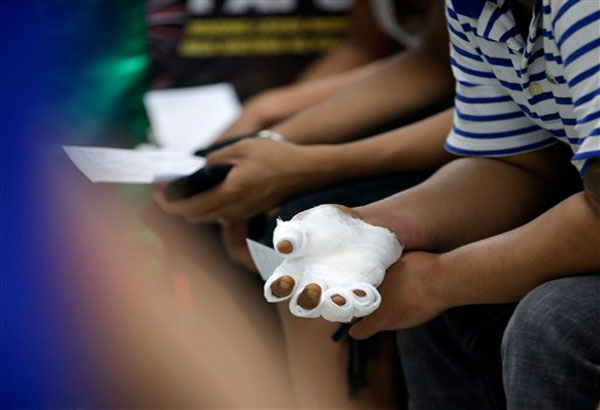HSA loopholes allow funneling of terrorist funds – BSP
Bangko Sentral ng Pilipinas (BSP) assistant governor and general counsel Juan de Zuniga said the controversial Human Security Act of 2007 has loopholes that will allow foreign funding of terrorist activities when the funds are kept in foreign currency deposits that could not be examined by authorities.
He said the HSA did not include foreign currency deposits in the accounts that could be examined by authorities. The HSA covers bank deposits, trust accounts, placements, assets and records but foreign currency deposits were not included.
De Zuniga said the loopholes could be used by terrorist groups to maintain funds in foreign currency accounts which are still protected by the secrecy provisions of the General Banking Law.
He said that authorities could enforce the Anti-Money Laundering Act (AMLA) and examine foreign currency deposits only if there is evidence that the accounts are involved in money laundering.
“Then we can use the provisions of the AMLA to address this. But that’s only if the funds are suspected to be dirty. Terrorist funding is also done with clean hands,” he added.
De Zuniga said the failure to include foreign currency desposits in the HSA was an oversight by legislators.
He said the BSP, the Anti-Money Laundering Council and the Anti-Terrorism Council will have to forge a memorandum of agreement that would outline how the agencies will collaborate to intercept terrorist funds.
He said the inter-agency collaboration is critical since the examination of financial accounts requires a degree of expertise which law enforcement authorities do not have.
Under the law, the BSP is not mandated to investigate terrorist funding since the HSA only authorized law enforcement agencies to probe such funds.
Meanwhile, Senate Minority Leader Aquilino Pimentel Jr. expressed support yesterday for the proposal to amend the HSA although he had already introduced a number of safeguards to the law to ensure the respect of human rights.
Pimentel had launched an information campaign on the safety nets of the new law passed by the 13th Congress to address terrorism in the country.
In a press conference yesterday, Pimentel admitted he was compelled to work on the safeguards of the anti-terror law because he saw that the bill would be passed without much opposition.
A staunch human rights advocate since the Marcos regime, Pimentel said he and Sen. Juan Ponce Enrile managed to discuss pertinent provisions of the anti-terror law which was renamed the Human Security Act (HSA).
Quoting portions of his book on the HSA of 2007, Pimentel pointed out what he described as invasive provisions of the law which were safeguarded by most of the amendments he introduced during deliberations last December at the Senate.
Recognizing that terrorism does not know boundaries, Pimentel revealed that the law can be applied to those who either do terrorist acts even abroad against citizens, embassies and other vital installations of the country or conspire to do so.
Pimentel said several sections of the HSA included safety precautions against possible abuse by law enforcers.
Section 7 on surveillance cannot be implemented by law enforcers unless there is a written notice from court.
Section 7 allows any mode or type of electronic or other surveillance equipment or intercepting and tracking devices, to listen to, intercept and record communications, between members of a judicially declared and outlawed terrorist organization, association, or group of persons or of any person charged with or suspected of the crime of terrorism or conspiracy to commit terrorism.
Regarding Section 18 which allows law enforcers to arrest a suspect without warrant, Pimentel said that the detention of persons charged with terrorism should be limited to not more than three days.
He said that warrantless arrests and detentions require the police to present the suspect to a judge nearest the place of arrest.
Arrest should be based on surveillance, examination of bank deposits as approved by the Court of Appeals, Pimentel said.
In an actual or imminent terrorist attack, suspects may not be detained for more than three days without the written approval of a local official of a Human Rights Commission or judge, the Sandiganbayan or a justice of the Court of Appeals.
Pimentel said if the arrest is made on Saturdays, Sundays, holidays or after office hours, police shall bring the suspect to the residences of the officers nearest the place of arrest.
The approval in writing shall be secured by the police or law enforcement personnel concerned within five days after the date of detention.
Within three days after detention the suspects, if connection with the terror attack or threat is not established, shall be released immediately.
Despite the provisions of Republic Act No. 1405, the justices of the Court of Appeals designated as a special court to handle anti-terrorism cases after satisfying themselves with the existence of probable cause in a hearing called for that purpose may allow examination of bank deposits and other pertinent acts. – With Christina Mendez
- Latest
- Trending






























